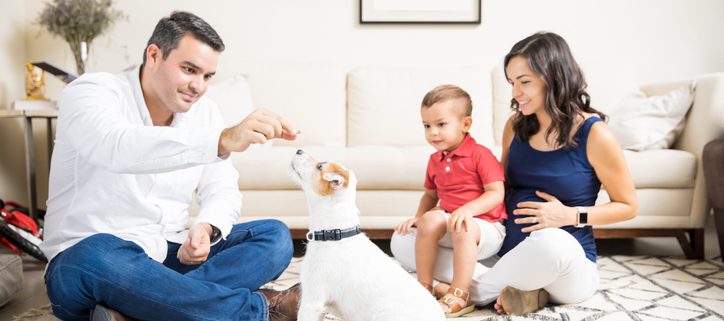Socialize Your Puppy
All puppies go through critical stages – important times when the environment profoundly influences later behavior. There are several critical stages in your dog’s psychological development, and some excellent books on the subject. Here’s information that will help you handle your puppy properly.
Early socialization is critical to a dog’s healthy psychological growth. Think it’s too late? your dog’s already grown? Read on anyway. You’ll get some insights into your adult dog’s behavior:
From 8-16 weeks of age is the time when most puppies are adopted. Early socialization during this period is important because socialized dogs have better coping skills. A broad range of positive experiences will help your puppy grow up to be a well-rounded, stable dog. Lack of socialization can lead to a dog that is afraid of people, new experiences and new places.
How is a puppy socialized? By going to new places, meeting different people and experiencing new things. This early exposure helps a dog take new things in stride throughout his life.
Here’s a common example of why socialization is important: A young couple adopts a puppy. A few years later they have a baby. If, as a puppy, their dog was socialized to babies (even just one), he will adjust better to his new “sibling” than if he had not had that experience.
Socialization is easy and it’s fun. Take your puppy visiting; to the city; to the country; invite people of all ages to talk to and stroke him. That part’s easy. Puppies are “people magnets.” Just take care that he doesn’t get overly tired or frightened, and that he isn’t inadvertently hurt by a well-meaning child or an unknown dog.
This is the ideal time to start your puppy’s Basic Training, teaching him the “rules” of your home, as well as starting in a positive, Puppy Pre-School or puppy class. A good puppy class offers the perfect prescription for socialization – a new place, friendly people, other puppies, and learning new things.
Socialization for life Socializing your dog doesn’t end when your pup is four months old. The well-rounded, well-behaved, happy dog experiences life – goes places; does things; is your companion. The more activities you share throughout your dog’s life, the happier she will be – and you will be, too.
If your dog isn’t sufficiently well-behaved to take visiting at Grandma’s, or hiking in the woods, or she won’t lie quietly under your table at an outdoor café – train her. Work on manners as part of your daily interaction with your dog, and then take the show on the road. Good behavior isn’t an accident; it takes effort – but it’s well worth it.
Here’s an example of how to do it. Start at home teaching your dog to lie quietly by your side while you eat. Train in different places around the house – kitchen, dining room, family room, indoors and out. Whenever you’re eating – even just a snack, make it a ritual. Soon she’ll start to understand that when you eat, her job is to lie quietly next to you. That accomplished, plan a field trip to an outdoor café. These first excursions are for the sole purpose of focusing on your dog, helping her learn civilized public behavior. Think of it as a day of “Mocha-chino and manners.”
Once you’ve worked on your dog’s good behavior in a variety of new places, she’ll be a pleasure to take anywhere. Her good behavior will become as natural as breathing.
A dog is most content when she is part of your life and your activities. And you’ll have the greatest canine companion imaginable. Could anything be better?



